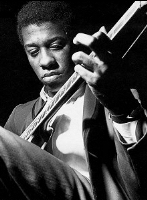Grant GreenGuitar |
 |
|---|
Grant GreenGuitar |
 |
|---|
"Perhaps the greatest testament to his musical gift was that at a time when the guitar had fallen out of favor, suddenly, Grant Green could be heard everywhere, recording with several of the finest rhythm sections in New York."
--Ben Sidran
Grant Green was widely known for his ability to play melodies. It didn't really matter what kind of melodies because Grant could do Latin tunes (The Latin Bit); Gospel songs (Feelin' The Spirit); Western melodies (Goin' West); as well as standards, blues, or jazz tunes. He had a great guitar sound and knew instinctively how to make melodies come alive.
Grant really arrived in 1961. He had made records in 1959 with his hometown friend, Jimmy Forrest, for Delmark and the following year he recorded with organist Sam Lazar, another St. Louis musician, for Argo. But when Lou Donaldson heard him playing in East St. Louis, he convinced Grant and clubowner Leo Gooden to come to New York and talk with Alfred Lion of Blue Note. From 1961 through 1965, Grant Green made more Blue Note LPs as leader and sideman than enyone else. Clearly, he was a favorite, not only of Lion, but of Ike Quebec who did much of the A&R work for Blue Note until his death in 1963.
Considering Grant's versatility, it is not unusual that Blue Note used him in a variety of contexts: Herbie Hancock, Lee Morgan, John Patton, Lou Donaldson, Ike Quebec. At a time when Down Beat was still giving New Star awards, Grant won in 1962. But critical raves have never helped in earning a living.
Grant worked often with Jack McDuff during those early years, and was really scuffling for money. In addition to everything else, Grant had a narcotics habit. Now it may be hard to understand in the jazz world of today, when musicians have generally learned to avoid the excesses of heroin and get their business together, but jazz players were very low in the economic strata of the early 60s, and one consistent source of revenue was the record company. It seems likely that Blue Note recorded Grant frequently during those years because he was always drawing money from Blue Note. Grand did at least six LP sessions under his own leadership for Blue Note in 1961! The furious recording pace continued right into 1965, and try as they might, Blue Note could never issue the LPs as fast as Grant could record them!
In a sense, Grant's situation and that of Sonny Clark were similar. They had the identical problems and each was a Blue Note favorite.
Between 1965 and 1968, Green was still active as a performer, but his recorded appearances were few. When he returned to Blue Note in 1969, he had rid himself of the narcotics problem, but had acquired a new attitude toward music. The huge success of Wes Montgomery, Kenny Burrell, and George Benson was very much on his mind. He considered himself the musical equal of all of them, yet he was the only one not to have made a significant commercial breakthrough.
His repertoire tended more toward rhythm & blues during his late Blue Note period. He would use repetitive vamps rather than chord changes as a harmonic underpinning and his attention to phrasing melodies (always an outstanding feature of his work) became even more pronounced. And the commercial break happened for him! From 1969 to mid-1974, his Blue Note LPs were consistent best sellers and he was a popular attraction at clubs across the USA. He split with Blue Note shortly thereafter and made an LP for Kudu and another for Versatile.
Grant spent much of 1978 in the hospital with a variety of ailments, and he was not a well man when released in December, 1978. His doctors advised him to rest, but there were expenses to meet, so he went back on the road almost immediately. He died of a heart attack on January 31, 1979.
During 1969 and 1970 when I was producing records for Prestige, I got to know Grant Green well. He played on albums with Rusty Bryant, Don Patterson, Charles Kynard and Houston Person which I supervised. I used to marvel at the ease with which this man with enormous hands could make that guitar sing. At one session, during a break, he treated everyone to a solo rendition of "Oleo" which was stunning. After his death, I thought many times of how his career would be judged by historians, since so much of his later recordings were in a commercial vein. But with albums such as Matador, Gooden's Corner, and Oleo, his stature is assured.
Without question, Grant Green was one of the major artists on the guitar during his lifetime. His friend, Lou Donaldson, put it best when he said: "All the top guitarists who came later--like George Benson and Pat Martino--they've got some of Grant's stuff."
--BOB PORTER, from the liner notes,
Oleo, Blue Note.
A selected discography of Grant Green albums.
| Find Grant Green on Amazon.com | Find Grant Green on eBay.com | |
|---|---|---|
| Grant Green CDs on Amazon | Grant Green CDs on eBay | |
| Grant Green Biography, BOOK, 2002 | Grant Green LPs on eBay | |
| Best of Grant Green MUSIC BOOK | Grant Green DVD / VHS on eBay | |
| Grant Green for Guitar MUSIC BOOK | Grant Green BOOKs on eBay |
 Music |
 Home |
 Musicians |
|---|
|
Any comments, additions or suggestions should be adressed to:
The Hard Bop Homepage / Eric B. Olsen / ebolsen@juno.com |
Other Web Sites:
The Film Noir 'net A History of Horror The War Film Web Author Eric B. Olsen |